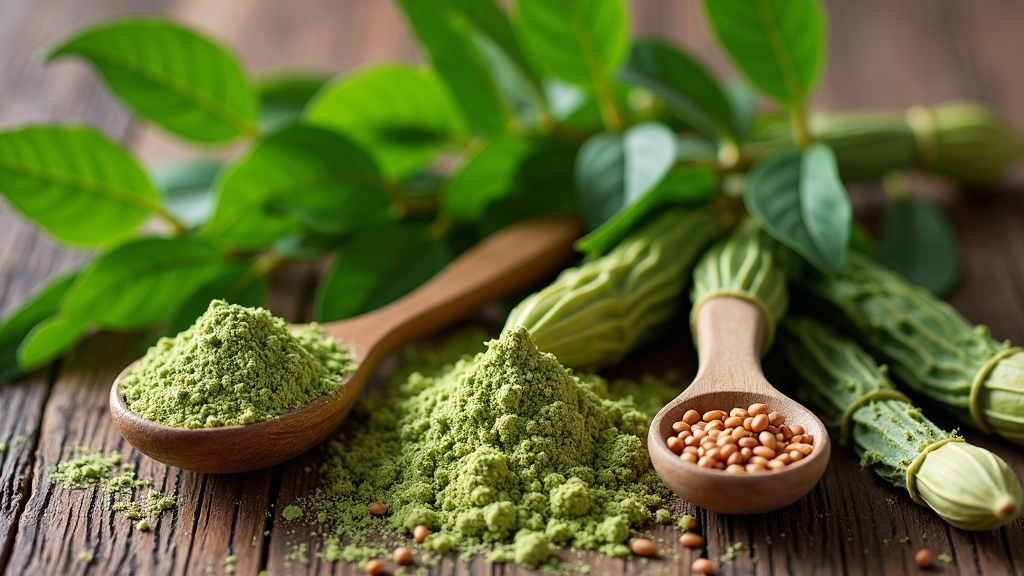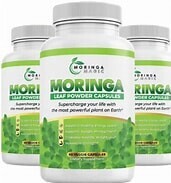Moringa has been gaining popularity as a superfood, and I’m often asked why it gets so much attention. Known scientifically as Moringa oleifera, this plant is sometimes called the “miracle tree” because almost every part of it can be eaten and is packed with useful nutrients. I find it’s one of the easiest superfoods to add to my daily routine, and modern research keeps uncovering new ways it can help support good health.

Why Moringa Is a Superfood
Moringa stands out because of its dense nutrient profile. When I look at what one tablespoon (about 7 grams) of moringa leaf powder delivers, it’s easy to see why:
- Vitamin C: Roughly 12% of your daily need
- Iron: Around 11% of daily value
- Vitamin B6: About 9% of daily needs
- Magnesium and calcium: Both are present in meaningful amounts
- Protein: About 2 grams per serving (which is a lot for a leafy plant)
- Strong antioxidants: Like quercetin, chlorogenic acid, and betacarotene
Moringa leaves contain much more vitamin C than oranges, more potassium than bananas, and more calcium than milk by weight. I think that’s pretty wild for a single plant, and that’s why I keep it stocked in my kitchen. Not only is it nutrient-packed, but it’s also easy to mix into many recipes, from shakes to baked goods.
What’s even cooler is that moringa grows quickly even in tough conditions, making it an accessible, nutrient-rich option in many regions where other vegetables are hard to come by. Families in Asia and Africa often grow it right in their backyard for instant nutrition—a testament to its popularity and usefulness.
7 Science-Backed Health Benefits of Moringa
Several benefits of moringa are now supported by research. Here are some of the main reasons why I use moringa and why you might want to give it a try.
- Provides Powerful Antioxidants
Moringa leaves are packed with antioxidants like quercetin and chlorogenic acid. These compounds help the body fight free radicals, which can contribute to cell damage and aging. A study listed in PubMed found that moringa consumption increased antioxidant levels in participants. I notice I feel brighter and less rundown on days I remember to mix moringa powder into my smoothie. - Lowers Blood Sugar Levels
Several studies show moringa may help lower blood sugar, which is really important for people who are watching their sugar for various reasons, including diabetes or prediabetes. In clinical trials, taking moringa actually led to lower fasting blood sugar and better insulin response. For me, this makes moringa a natural addition if I’m aiming for steady energy during the day. - Reduces Chronic Inflammation
Moringa has compounds called isothiocyanates that may help keep inflammation in check. Inflammation is often involved in joint pain, heart concerns, and other health issues. Research indicates moringa extract can help reduce markers of inflammation, especially CRP and TNF-α, which are linked to discomfort and swelling. I personally notice gentler digestion and less soreness after adding it to my routine. - Supports Heart Health
Keeping cholesterol and blood pressure in a healthy range is something I care about. Moringa can make a real difference here. Researchers have found moringa lowers LDL (“bad”) cholesterol, helps keep blood pressure down, and may limit plaque buildup in arteries. Potassium in moringa also supports good blood pressure. Over time, including moringa in my diet has been a gentle and natural way to support my heart health. For those concerned about heart wellness, moringa is an easy option to try. - Boosts Immunity and Fights Infections
I like that moringa naturally supports my immune system. It’s been shown to fight off certain bacteria, viruses, and fungi. Studies suggest the antibacterial properties make moringa helpful for everyday immunity, as well as supporting recovery when fighting things like colds or other infections. Some use moringa to speed up wound healing or help with urinary tract infections, and others find it useful for keeping minor skin irritations at bay. - May Step Up Brain Function
Moringa is rich in antioxidants like vitamin E and betacarotene, which can help protect the brain from oxidative stress. Research points to possible improvements in memory and focus. It may even support protection against cognitive decline. I find it’s a simple way to add some brain support when I’m busy or feeling scattered. More studies are being done to look at its potential to help with mood and mental energy too. - Aids Digestion and Detoxification
I’ve found moringa helps my digestion by promoting healthy gut bacteria, reducing bloating, and easing constipation. Some studies also show moringa can limit the effects of toxins like arsenic, making it a helpful aid in gentle detox routines. The fiber and key plant compounds make moringa a gutfriendly choice. If you’re looking for a natural way to keep your digestive system running well, moringa is a great go-to.
 Moringa Leaf Powder Capsules
Moringa Leaf Powder Capsules
Getting Started with Moringa: What You Need to Know
Add moringa to your routine with a little planning, especially if you’re new to superfoods. Here are some practical ways to use it and what I suggest looking for:
- Moringa Leaf Powder: The most popular form, perfect for smoothies, oatmeal, salad dressings, or blended into tea.
- Moringa Capsules: If you’re looking for convenience, capsules take the guesswork out of dosing and are easy to grab on busy mornings.
- Moringa Tea: Dried moringa leaves can be steeped for a nourishing, earthy drink.
- Moringa Oil: Often used on the skin and hair. I use this as a light moisturizer for my face and to tame split ends. I also like how it absorbs quickly without feeling greasy.
When I started, I aimed for 1 to 2 teaspoons of powder daily or one to two 500mg capsules. If you’re using tea, one or two cups a day is pretty gentle, and some people see benefits in just a couple of weeks. Since moringa is potent, you don’t need a lot to see effects—taking it slow and steady works best.
Common Questions About Moringa
These are questions I’m often asked by friends trying moringa for the first time:
Is moringa safe for everyone?
For most people, yes. I always recommend checking with your doctor if you’re pregnant, nursing, or on medications like those for blood pressure. Pregnant women should be extra careful, since some parts of the moringa plant may not be suitable.
Can moringa help with energy or weight?
Moringa doesn’t contain caffeine, so it won’t give you the jitters. The vitamins and minerals often help me feel naturally energized. Some research shows it can curb cravings and help you stay full longer, which is helpful if you’re working toward a healthy weight. By adding moringa powder to meals, you might find it’s easier to avoid unnecessary snacking.
How fast do results show up?
Some people feel better digestion or more energy in a week or two, but benefits like lower cholesterol, immunity, or inflammation often build up over a month or more. I stick to it daily for best results, and patience pays off when looking for long-term changes.
Where do I find goodquality moringa?
I’ve found it’s really important to pick organic, lab-tested moringa from reputable brands. Look for powders that are a vibrant green color, which signals freshness. If you opt for capsules, make sure they’re free of fillers and additives. Shopping at natural food stores or trusted online retailers usually gives the best options. Don’t forget to check the harvest and expiration dates for optimal quality.
Tips for Choosing and Using Moringa
- Start Small: Moringa is potent, so I suggest starting with a lower daily dose and increasing gradually.
- Check the Source: Select moringa that’s organic and free from pesticides. A trusted seller often shares lab testing info.
- Combine With Food: Moringa has a distinct taste that blends well into smoothies, soups, or cooked grains. Adding fruit or a splash of citrus can mellow out the earthy notes. I particularly enjoy it mixed with pineapple or mango for a tropical twist.
- Mix Up the Format: If you get tired of powder, try switching to capsules or tea for a change. I find that rotating keeps things interesting throughout the week. Mix things up so it never feels boring or forced.
Everyday Ways I Use Moringa
- I mix moringa powder into my morning yogurt or smoothies.
- I sprinkle it into salad dressings for an added nutrient boost.
- Moringa tea is my go-to on busy afternoons when I want something nourishing but caffeine-free.
- For my skin, moringa oil helps me keep things moisturized, especially in dry weather.
- Occasionally I add moringa powder to soup or homemade energy bars for a simple wellness upgrade. You can even try a pinch in sauces or dips for a green boost!
Wrapping Up
Moringa is a simple, natural way to boost nutrient intake and support a healthy lifestyle. Science backs up many of its benefits, from antioxidant power to helping with blood sugar and inflammation. By adding moringa to your daily routine, you can support immune health, brain function, digestion, and more. With so many options for use, it’s an easy addition to any wellness plan. I rely on it for an energy and health lift every day, and I think it’s a worthy superfood for anyone looking for a natural nutritional edge.
Click HERE to find out more about Moringa and where you can get it.
“Here is a little transparency: Our website contains affiliate links. This means if you make a purchase, we may receive a small commission. Don’t worry, there is no extra cost to you. It’s a simple way you can support our mission to bring you quality content”

This is such a well-explained and detailed look at moringa—thanks for laying everything out so clearly! I’m really interested in trying it for its antioxidant and anti-inflammatory benefits, especially since you mentioned it might help with digestion and energy levels.
Quick question: For someone just starting out, do you think moringa powder or capsules are more effective in terms of nutrient absorption and noticeable results? Also, are there any specific times of day you recommend taking it for the best impact?
Looking forward to your thoughts—this post definitely inspired me to add moringa to my routine!
Hi Jason,
Thanks so much for your thoughtful comment—I’m glad the post sparked your interest in moringa! It’s one of those superfoods that really delivers on multiple fronts, and it’s great to hear you’re exploring it with digestion and energy in mind.
For those just starting out, both powder and capsules can be effective, but I personally prefer the capsule form. It’s more convenient for daily use and allows for consistent dosing without the strong earthy taste that the powder sometimes carries. That said, if someone enjoys blending smoothies or cooking with superfoods, the powder can be a versatile addition.
As for timing, taking moringa in the morning or early afternoon works well for most people. It pairs nicely with breakfast or lunch and can help support energy and digestion during the day. Since moringa also contains a mild natural stimulant effect, it’s best to avoid taking it late in the evening.
If you’d like help choosing a high-quality moringa product or tips on pairing it with other gut-friendly nutrients, I’d be happy to share more. Wishing you an energizing start with this powerful plant!
You asked me in a previous question, referring to my post “Moringa for Gut Health & Skin” that I inadvertently overlooked. That question was, if moringa is more effective when paired with probiotics, or can it still make a noticeable difference on its own?
As for pairing it with probiotics, that’s a smart move. Moringa already acts as a natural prebiotic, which helps feed beneficial gut bacteria. Combining it with quality probiotics can enhance overall gut function, reduce inflammation, and even support clearer skin. That said, moringa can still offer noticeable improvements on its own, especially in digestion and energy levels, but pairing it gives you a more synergistic effect.
If you’re exploring product options or want tips on building a simple gut-friendly routine, I’d be happy to share more ideas! Thanks again for engaging so deeply.
Regards
Oren